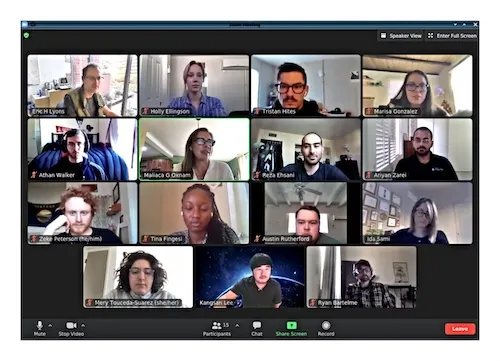UArizona Program Empowers Students to Combat Climate Change
The Roots for Resilience graduate assistantship applies data management and open science to combating climate change across academic disciplines.

The first-ever cohort of graduate assistants in the University of Arizona's new Roots for Resilience program recently completed its first semester, providing 11 students in diverse disciplines with training in the most progressive techniques in modern open data science.
"This assistantship is focused on bringing students from a variety of academic domains into the data science realm, and using data science techniques to encourage discoveries within their domains," said Holly Ellingson, program coordinator for Roots for Resilience.
The semester-long program is funded and co-led by CyVerse, the UArizona Data Science Institute, and the Arizona Institutes for Resilience, which fosters collaborations to develop solutions for human and natural communities across the globe.
Funded graduate assistants take CyVerse's Foundational Open Science Skills course and apply the open science principles and FAIR (findable, accessible, interoperable, and reproducible) data science techniques they learn to a climate-related project within their own field of study. The students then present the outcomes of that project within their departments to disseminate the skills they've learned in CyVerse data management and open science principles.

Members of the Spring 2021 Roots for Resilience graduate assistantship met virtually with program leaders.
Students and faculty doing environment- and resilience-related research have significant datasets to work with but not necessarily the data science tools and skills they need to process them, observed Betsy Woodhouse, a Roots for Resilience program leader and Associate Director of the Arizona Institutes for Resilience. "We designed Roots for Resilience to address this situation. Through Roots, students not only advance their own research, but become ambassadors between their disciplines and CyVerse and the UArizona Data Science Institute, helping promote even more collaborations."
"More and more research groups seem to be moving into this space with their use of larger datasets and machine learning algorithms for modeling and hypothesis testing," said Austin Rutherford, a PhD candidate in the School of Natural Resources and the Environment who participated in the program.
Rutherford studies how episodes of extreme dry and wet events, which are predicted to continue and worsen with climate change, influence the establishment of velvet mesquite seedlings in Sonoran desert grassland ecosystems. His work will help inform GIS mapping and machine learning modeling used in land management and conservation decisions.
Added Rutherford: "I got immense value from the techniques and topics related to data management plan creation, how to manage data effectively, how to make my analyses more reproducible, licensing of programming code and data itself to ensure they are used as intended, and the importance of metadata and Digital Object Identifiers."
Participants in the spring program included students from law, government and public policy, environmental sciences, natural sciences, computer science, architecture, geography, hydrology and atmospheric sciences, and chemical and environmental engineering.
"FAIR and open science principles are specifically important to computer science," said Ariyan Zarei, a PhD candidate in the Department of Computer Science, explaining how accessible and reproducible code and data is essential for researchers to compare their methods to previous procedures and compare outcomes.
Zeke Peterson of the College of Law noted: "data science is playing a growing role in legal scholarship. Without open science, other lawyers and students will have no way to confirm the validity of empirical studies and data-driven legal scholarship."
For environmental health sciences student Tina Fingesi: "Data science opens an opportunity to access information and work collaboratively to allow scientific progress to reach its full potential. I am glad I gained this hands-on knowledge on data science at the beginning of my program. This will enable me to ensure my research tools, methodologies and results are accessible and reusable for other researchers."

